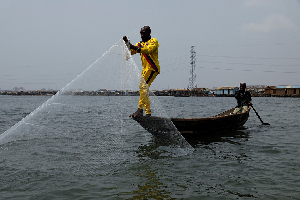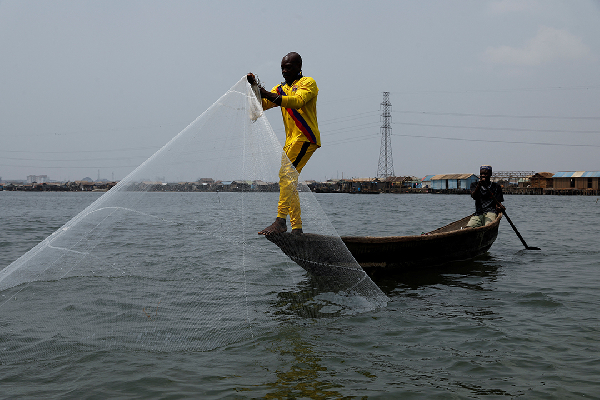 File photo of fisherman at sea
File photo of fisherman at sea
Kofi Agbogah, the Director of Hen Mpoano, a non-governmental organisation on coastal and marine ecosystems, has expressed fears that Ghana’s fisheries will crash if artisanal fishers are continuously exempted from the closed season.
His reaction followed an earlier announcement by Madam Emelia Arthur, the Minister of Fisheries and Aquaculture, on the cancellation of the participation of artisanal (canoe) fishers from the 2025 closed season, which is expected to be observed by inshore fishers and industrial trawlers.
Mr Agbogah, at a media forum powered by the Ghana Ports and Harbours Authority (GPHA), said the closed season was scientifically based and had the legal backing from the Fisheries Act 2002, Act 625, as a measure to sustain the fisheries in Ghana’s marine waters.
Addressing the issue on “Sustaining Ghana’s Closed Fishing Season: Science, Policy, and the Future of Fisheries,” he noted that over the years Ghana had seen the dwindling of its fish stock, which was threatening it at the brink of collapse.
“Way back in 1996, the total that we landed was around 274,000 metric tonnes, however today, we are hovering around 20-22,000 metric tonnes. This gives reason for some drastic measures to be taken,” he said.
He said the sea needed that rest to replenish, but if fishers continued to fish like that, within the next five to 10 years, the pelagics, which were the mainstay of all coastal economies and the fisheries, would no longer be there.
Mr Agbogah stressed that to conserve the fish in the sea, was to allow them to reproduce, expressing worry that the new directive, meant that the season where they would have to reproduce was the period that the government was asking artisanal fishers to go and fish, which would derail the gains made in the past few years of the closed season.
Mr Agbogah argued that canoe operators harvested about 70 percent of the small pelagics, which were dwindling; therefore, Ghana’s attention should be on the canoe fishers rather than the industrial trawlers.
He said Ghana had become a beacon of the closed season in the sub-region, and it was worrying that while other countries commenced the closed season because of Ghana, the exemption of the artisanal fishers may put advocates in a difficult position to defend the directive.
“The consequences are dire; we are going to lose our fisheries. Fishermen will not have anything to behold, their culture will be thrown to the wind, and poverty will stare everybody in the face.
“Let us remember that about three million Ghanaians directly or indirectly depend on the fisheries, but the value chain and downstream beneficiaries are huge,” he said.
He added that “If they say it is for this year, we will wait and see, but if it continues, we are going to have issues, because the small pelagic is the mainstay of our economy, When canoes land fish at the beach, it goes all the way down to the poor man in the community; it provides food security, national security, job security, nutritional security and so many securities”.
Mr Agbogah observed that if there was enough fish stocks in the ocean, fishermen would not go and beg for jobs from the government, as they were their own employers, stressing that “I am looking at the day that there are no fish and they all march to the government and ask for jobs”.
He stated that Ghana’s fisheries were worth about US$750 million in total or one per cent of the country’s Gross Domestic Product if the nation could bear to lose that.
“The consequences of collapsing the fisheries are something that government will regret, as the pressure on government will be too much. The purpose of the closed season is to ensure that by 2035 we should recover about 90,000 tonnes, and getting to 2040, if we get things right, we should go a lot higher,” Mr Agbogah said.
He said there was a sign of gradual recovery, however if the closed season which allowed the male and female fish to come together to mate was disturbed by fishers, the fishes would be scattered and could not get the chance to be pregnant.
